
BOJ monetary easing signals a weaker yen
Despite voiced scepticism of Abe adviser Honda, Japanese overseas acquisitions indicate companies think policies will drive currency lower
The yen may weaken appreciably beyond 120 to the US dollar once the new Japanese financial year, beginning on April 1, gets into full swing, despite the view expressed last week by Etsuro Honda, an economic adviser to Prime Minister Shinzo Abe, that he is sceptical such a move could occur.
It will not be lost on the currency markets that Abe is due to visit US President Barack Obama late next month, and with that in mind, Honda's comments are perhaps timed to try to head off a weakening of the yen in the interim so as to avoid any further yen weakness becoming a source of contention at the bilateral meetings.
However, the divergent monetary policy directions of the Bank of Japan and the US Federal Reserve stand out like sore thumbs, arguably undermining the validity of Honda's position.
While the Fed has ended quantitative easing and is edging, albeit cautiously, towards a tightening of policy, the Bank of Japan continues to go full throttle with its own aggressive monetary easing policies. The throttle analogy seems appropriate.
"In order to escape from a deflationary equilibrium, tremendous velocity is needed just like when a spacecraft moves away from the Earth's strong gravitation," Bank of Japan governor Haruhiko Kuroda said.
The data would suggest that the escape velocity needed for Japan to break out of that deflationary equilibrium has not yet been achieved.
Japan's core consumer price index (which excludes perishables but includes energy) increased 2.2 per cent year on year in January, down from December's 2.5 per cent jump, and largely attributable to a fall in energy prices.
However, if the direct impact of last year's consumption tax rise is also hacked out of the data, that same January core CPI figure is estimated by the Bank of Japan to have risen only 0.2 per cent, down from a 0.5 per cent rise in December.
"The BOJ's commitment to achieving the price stability target of 2 per cent is unshakeable," deputy governor Hiroshi Nakaso said at the end of last month, emphasising the Japanese central bank's resolve to loosen monetary policy even further, if needed, to ensure its target is met.
That might yet be needed as recent retail sales data suggests that the Japanese consumer is unconvinced prices have broken out of their deflationary orbit.
Household spending has fallen for 10 straight months, including a 5.1 per cent tumble in January on a year-to-year basis, suggesting the deflationary mind-set of Japanese consumers is not yet broken, even if part of their reticence is attributable to the fact wages have not yet risen fast enough to compensate for the effect of last year's sales tax rise.
It seems logical for the Bank of Japan to pursue a similar or even more radical monetary policy line, along a path that had already resulted in the yen sliding against the dollar long before markets began to think the Fed might actually tighten policy.
That weakness of the yen, especially combined with lower energy costs that improve the competitiveness of Japanese industry on the world stage, is itself critical to Japan's prospects, giving the country's exporters a competitive edge.
Factory output in Japan jumped in January, with a rise in exports a key component, but export competitiveness cannot be taken for granted.
Whether or not China widens the trading band for the yuan, as some have suggested, traders and analysts seem convinced Beijing's intention is to guide the mainland currency weaker so as to reinforce China's international competitive position.
Markets might reason the yen should fall too, if Japan was to retain competitiveness with China, or indeed with other economies whose policymakers might wish their own currencies to follow a weaker trajectory for the yuan.
Japan's own companies seem to think the yen has further to fall, making overseas acquisitions in local currencies that entail very large unhedged selling of the Japanese currency.
Some US$27 billion of overseas acquisitions by Japanese have occurred already this year, almost half of the US$56 billion total for all of last year, according to data from Thomson Reuters. In stark contrast, the total for domestic deals hit a 16-year low of US$36 billion last year.
Whether looked at from a domestic perspective or in an international context, the continuing weakness of the yen and indeed its further weakening against the dollar, seems eminently plausible in the new Japanese financial year, even allowing for Abe adviser Honda's voiced scepticism about such a move.

